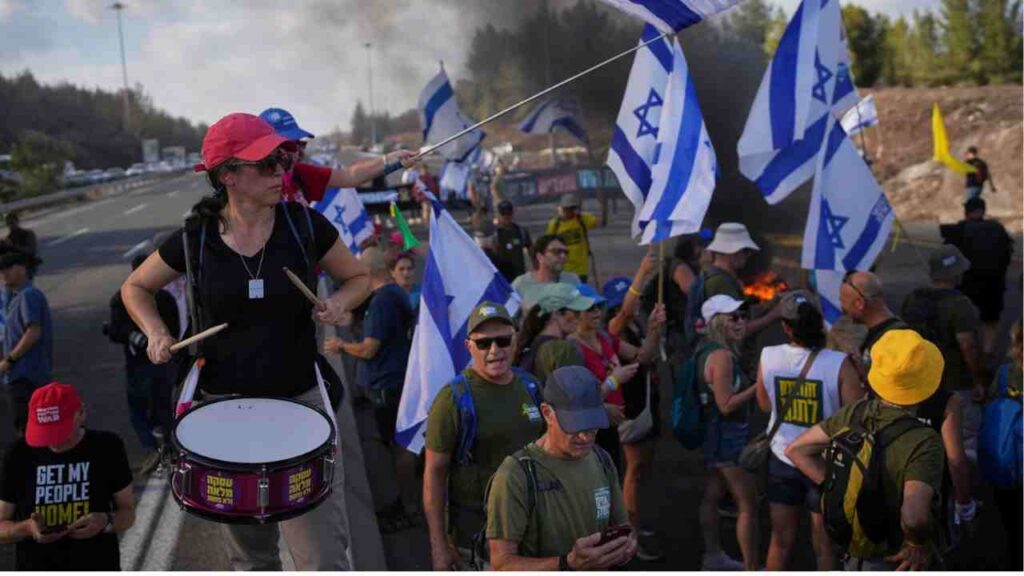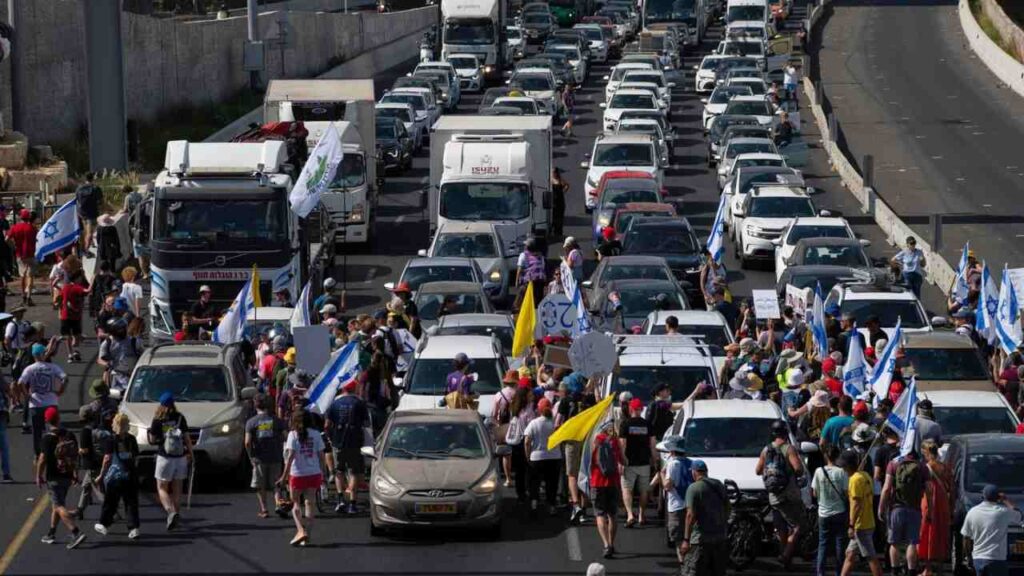Families of hostages held in Gaza launched their most significant protest campaign in months, staging a nationwide “day of stoppage” that brought widespread disruption across Israel as they demanded immediate government action to secure their loved ones’ release.
Police arrested 32 demonstrators for “disruption of order” during what organizers described as one of the largest coordinated actions since the discovery of six dead hostages in Gaza tunnels last September sparked nationwide outrage.

Widespread Civil Disobedience
The coordinated campaign saw protesters mobilize at dozens of strategic locations throughout the country, creating maximum disruption to press their demands. Demonstrators targeted:
- Major highways, where they blocked traffic lanes and lit bonfires that shrouded roads in smoke
- Politicians’ residences, bringing the crisis directly to lawmakers’ doorsteps
- Military headquarters and government facilities
- Commercial districts, forcing business closures
Police deployed water cannons against highway protesters who refused to disperse, highlighting the intensity of both the demonstrations and the official response.
Families’ Desperate Plea
The protests reflect growing desperation among hostage families who fear that continued military operations could doom the estimated 50 people still held in Gaza, with intelligence suggesting only about 20 remain alive.
“We don’t win a war over the bodies of hostages,” protesters chanted, summarizing their core argument that military pressure contradicts rescue efforts.
Former hostage Arbel Yehoud, speaking at Tel Aviv’s Hostage Square, articulated the families’ position: “Military pressure doesn’t bring hostages back – it only kills them. The only way to bring them back is through a deal, all at once, without games.”
Anat Angrest, whose son Matan remains in captivity, explained the moral urgency driving the protests: “Today, we stop everything to save and bring back the hostages and soldiers. Today, we stop everything to remember the supreme value of the sanctity of life.”
Government Caught Between Pressures
Prime Minister Benjamin Netanyahu faces an increasingly impossible political equation. While publicly demanding immediate hostage release, he must navigate a coalition that threatens to collapse over any potential ceasefire agreement.
Far-right cabinet members, led by Finance Minister Bezalel Smotrich, have made clear they will not support any deal allowing Hamas to retain power. When Israel previously agreed to a hostage exchange ceasefire, these same coalition partners threatened to topple Netanyahu’s government.
Smotrich dismissed Sunday’s protests as “a bad and harmful campaign that plays into Hamas’ hands, buries the hostages in the tunnels and attempts to get Israel to surrender to its enemies and jeopardize its security and future.”

Military Preparations Continue
Despite the domestic pressure for negotiations, Israel continues preparing for expanded military operations in Gaza City and other populated areas, aiming to eliminate Hamas’s remaining capabilities.
In a development that signals preparation for civilian displacement, the Coordinator of Government Activities in the Territories (COGAT) announced it would resume allowing UN imports of tents and shelter equipment into Gaza. Officials described this as preparation for “protective” evacuations from combat zones.
Humanitarian Crisis Deepens
The ongoing conflict continues to exact a severe humanitarian toll in Gaza. The territory’s health ministry reported that two children died Sunday from malnutrition-related causes, bringing the 24-hour total to seven such deaths.
Regional Escalation
The crisis extends beyond Gaza’s borders, with Israeli forces conducting airstrikes Sunday against a power plant in Yemen’s capital, Sanaa. The military said the strikes targeted energy infrastructure used by Iran-backed Houthis, who have launched missiles at Israel and attacked Red Sea shipping since the war began.
The expanding regional dimension adds another layer of complexity to an already intractable situation, as Israel faces pressure on multiple fronts while grappling with the fundamental question of whether military victory or negotiated compromise offers the best path forward for both the hostages and the nation’s long-term security.






